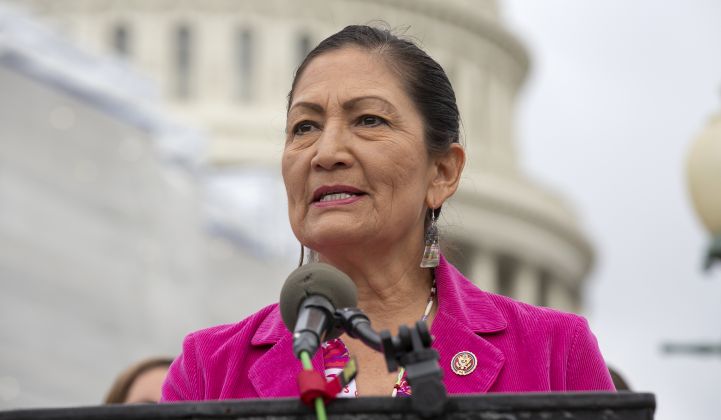U.S. Representative Deb Haaland, a Democrat from New Mexico, is Biden’s pick for the top job at the Department of Interior, according to Thursday news reports.
If confirmed, Haaland, an enrolled citizen of the Pueblo of Laguna, would be the first Native American cabinet secretary and head of the department that manages federal lands, which encompass 28 percent of the nation. The Department oversees U.S. natural resources, commitments to tribal nations and the public lands the government obtained through forced removal of Indigenous people.
A group of tribal leaders, climate activists and progressive advocates and policymakers had rallied around Haaland, saying the nomination would help set the federal government on course to reckon with the U.S.’ colonial foundations while elevating a policymaker with significant knowledge of the Department of Interior’s purview.
“It is truly a historic and unprecedented day for all Indigenous people,” said Navajo Nation President Jonathan Nez in a statement on the decision. In November, Nez said a Haaland nomination would send “a clear message to all tribes and people across America that the Biden-Harris administration is committed to addressing the wrongs of the past and clearing a path for real change and opportunity for tribal nations.”
Haaland graduated from Emerge New Mexico, an organization that trains Democratic women to run for office, in 2007. She served as chair for New Mexico’s Democratic Party and ran for lieutenant governor in the state in 2014, before being elected to Congress in 2018.
The pick will have significant repercussions for energy development.
The role of public lands in Biden's clean energy strategy
The Interior Department’s Bureau of Land Management is responsible for vast tracts of federal land, much of it in Western areas ripe for renewable energy development. Under the Obama administration, the BLM issued rules to open up much of this land for clean energy leasing. But under the Trump administration, BLM shifted to opening leases for fossil fuel exploration and offered royalty and rent cuts to oil and gas producers on public lands during the coronavirus pandemic.
Biden has said he will end new oil and gas drilling on public lands, a pledge that could complicate Haaland's confirmation. Renewables advocates are hoping the new Interior Secretary will ease the way for renewables development in those areas.
“There's lots of opportunity to deploy solar on public lands. Making sure that there's an efficient and timely permitting process and access on those public lands [will] be important,” said Abigail Ross Hopper, president and CEO of the Solar Energy Industries Association, in an early December interview.
In November, Haaland, who is vice chair of the House Natural Resources Committee, said at a Reuters event that “leasing practices need to be changed” to help increase clean energy leases.
This year the Trump administration approved Arevia Power and Quinbrook Infrastructure Partners’ 690-megawatt Gemini solar project, slated to be among the largest solar projects in the U.S., but not before it hit permitting hiccups.
The Interior Department also operates the Bureau of Ocean Energy Management, the agency responsible for permitting offshore wind projects. Last year BOEM delayed the permitting process for Vineyard Wind, the country’s leading contender for the first commercial-scale offshore wind farm, which has forced the project to delay its completion date and rework its economics to account for the resulting decline in the value of the federal investment tax credits it is eligible to receive. BOEM’s decision to conduct an analysis of the environmental impacts of East Coast offshore wind development has been decried by critics such as Sen. Sheldon Whitehouse, Democrat of Rhode Island, as an attempt to slow the growth of an industry that could provide clean energy to compete with natural-gas power plants.
In a recent interview with The Washington Post, Haaland spoke to an interest in transitioning traditionally fossil fuel-reliant economies.
“I come from New Mexico. It’s a big gas and oil state. And I care about every single job,” Haaland told the paper. “[But] we don’t want to go back to normal, right? We don’t want to go back to where we were because that economy wasn’t working for a lot of people.”
New Mexico gets roughly 20 percent of its electricity from renewables, and last year the state passed a mandate to expand that to 50 percent by 2030 and 80 percent by 2040. But the state could lose up to $946 million a year in tax revenue through 2025 under a proposed ban on oil and gas lease on federal land, according to a study from the state of Wyoming released this week. The Navajo Nation and other Indigenous nations have fought to include economic recovery funding for jobs and revenues to be lost from the closure of coal-fired power plants in the region.
Haaland won reelection to her House seat in November, and her potential confirmation would narrow the majority Democrats hold in the House of Representatives. On Wednesday, Speaker Nancy Pelosi signaled her support, calling Haaland an “excellent choice” for the job.




